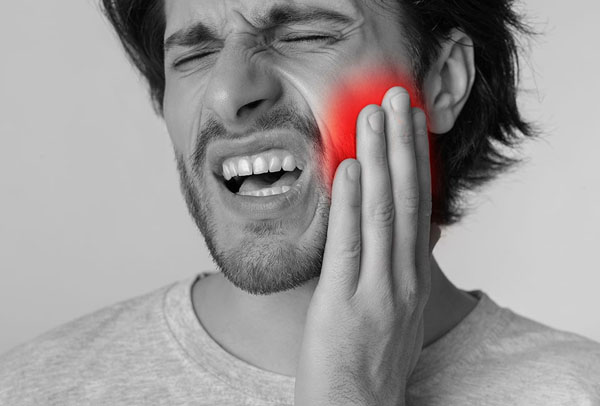TMJ Ankylosis in Knoxville, TN
Restore Jaw Function Through Effective TMJ Ankylosis Treatment
When temporomandibular joint (TMJ) ankylosis limits your jaw movement and causes chronic pain, you need specialized care from experienced oral and maxillofacial surgery professionals. Our Knoxville dental practice explains the comprehensive TMJ ankylosis treatment using the latest surgical techniques and total joint replacement options to restore normal jaw function and improve your quality of life.
If you’re experiencing jaw joint stiffness, limited mouth opening, or facial asymmetry, contact our TMJ dentist in Knoxville, TN, today. Call (865) 687-8670 to schedule your TMJ evaluation with Dr. Niral Patel. We proudly serve patients throughout East Tennessee, including Knoxville, Amherst, Marble City, West Knoxville, and surrounding communities.
What Is TMJ Ankylosis?
Temporomandibular joint ankylosis represents a severe condition where bony fusion or fibrous adhesion occurs within the jaw joint, preventing normal jaw movement. This debilitating disorder affects the temporomandibular joint (TMJ), which connects your mandible (lower jaw) to the temporal bone of your skull. When ankylosis develops, patients experience significant difficulty with basic functions like eating, speaking, and maintaining proper oral hygiene.
The condition manifests when scar tissue, reactive bone formation, or fibrous tissue restricts the joint space, ultimately leading to complete or partial jaw immobilization. Understanding the complexities of TMJ ankylosis is crucial for both patients and healthcare providers to ensure timely intervention and optimal treatment outcomes.
Classification of TMJ Ankylosis Types
Traumatic TMJ Ankylosis
Traumatic TMJ ankylosis, the most prevalent form of temporomandibular joint ankylosis, stems from jaw trauma. Sports injuries, motor vehicle accidents, and facial fractures can damage the articular surface and mandibular condyle, leading to scar tissue formation and eventual bony fusion. Post-traumatic ankylosis often affects the coronoid process and zygomatic arch, complicating surgical management.
Infection-Related Temporomandibular Ankylosis
Systemic infections, including osteomyelitis and septic arthritis, can cause severe inflammation within the joint space. When left untreated, these infections damage the articular disc and surrounding cartilaginous tissue, resulting in fibrous or bony ankylosis.
Rheumatoid Arthritis-Associated Ankylosis
Patients with rheumatoid arthritis face increased risk factors for developing TMJ ankylosis due to chronic inflammation affecting the TMJ structures. The autoimmune response damages the articular disc and promotes reactive bone formation.
Congenital Temporomandibular Joint Abnormalities
Some individuals inherit genetic predispositions that affect mandibular growth and joint development, potentially leading to ankylosis later in life. These congenital factors may impact the glenoid fossa formation and overall joint function.
Bilateral Temporomandibular Joint Ankylosis
This severe form affects both TMJ joints simultaneously, causing significant facial deformities and severely compromised jaw mobility. Bilateral ankylosis requires complex surgical reconstruction, often involving total joint replacement procedures.
Unilateral Ankylosis
When ankylosis affects only one side, patients may develop compensatory jaw movements and facial asymmetry. Early intervention is crucial to prevent progressive mandibular deviation and associated complications.
Root Causes and Risk Factors for TMJ Ankylosis
TMJ ankylosis can occur due to multiple factors, such as:
- Primary Trauma-Related Causes: Trauma is a primary cause of temporomandibular joint issues, often resulting from motor vehicle accidents (mandibular condyle fractures), sports injuries, falls (significant TMJ damage), and physical altercations (facial trauma).
- Infectious Complications: Poor oral hygiene can cause systemic infections, potentially leading to osteomyelitis spreading to the TMJ. Post-surgical infections after dental procedures and septic arthritis are also risks that can complicate recovery.
- Inflammatory and Autoimmune Factors: Joint health is significantly influenced by inflammatory and autoimmune factors. Examples include chronic inflammation in knee arthritis, widespread joint impact in ankylosing spondylitis, and similar effects from other autoimmune disorders.
- Surgical and Medical Complications: Prior TMJ surgeries, improper postoperative care, and inadequate surgical techniques can cause surgical and medical complications, impacting surrounding tissues and recovery.
Recognizing TMJ Ankylosis Symptoms
Primary physical symptoms include:
- Severe limitation in mouth opening (trismus)
- Jaw joint pain and stiffness
- Clicking or grinding sounds during attempted jaw movement
- Facial asymmetry and deformities
- Difficulty with speech articulation
- Compromised chewing ability
Secondary complications include:
- Chronic headaches and myofascial pain
- Earaches and hearing difficulties
- Sleep disturbances due to jaw discomfort
- Nutritional deficiencies from eating difficulties
- Social and psychological impacts of facial changes
If you’re experiencing any combination of these symptoms, contact our Knoxville TMJ dentist immediately at (865) 687-8670 for a comprehensive evaluation and treatment planning.
Advanced Diagnostic Approaches
Our Knoxville dental team or an oral and maxillofacial surgery team conducts thorough clinical assessments, measuring maximal mouth opening and evaluating jaw function patterns. We assess facial symmetry, palpate jaw muscles, and examine the coronoid process mobility.
Some imaging technologies to help aid diagnosis:
- Computed Tomography (CT): Provides detailed visualization of bony fusion and joint space obliteration
- Magnetic Resonance Imaging (MRI): Evaluates soft tissue involvement and articular disc position
- 3D Imaging: Assists in surgical planning for joint reconstruction procedures
Cutting-Edge Treatment Options for TMJ Ankylosis
Conservative Management Approaches
Our treatment for pain and inflammation involves targeted medications, including prescription muscle relaxants for pain and tension reduction, and anti-inflammatory drugs to decrease joint swelling. We also employ pain management strategies for chronic discomfort.
Post-operative physiotherapy is critical for regaining jaw movement and preventing further ankylosis. We offer detailed postoperative rehabilitation instructions to facilitate a full recovery, emphasizing aggressive physiotherapy protocols.
Advanced Surgical Treatment Options
- Gap Arthroplasty: This surgical procedure creates space between fused bone surfaces, allowing for improved jaw mobility. The technique involves careful removal of ankylotic tissue while preserving healthy joint structures.
- Interpositional Arthroplasty: We utilize various materials for interpositional procedures, including autogenous tissues from the patient’s own body, acrylic spacers for joint separation, and fat graft placement to prevent re-ankylosis.
- Total Joint Replacement: For severe cases, particularly bilateral temporomandibular joint ankylosis, we offer state-of-the-art joint prostheses. Total joint replacement provides predictable outcomes and long-term jaw function restoration.
- TMJ Reconstruction Techniques: Our maxillofacial surgery team specializes in comprehensive joint reconstruction using custom-designed prostheses, computer-aided surgical planning, and minimally invasive surgical techniques.
Surgical Management Protocol
Our surgical approach follows established TMJ concepts for optimal outcomes:
- Pre-operative Planning: Comprehensive imaging and treatment plan development
- Surgical Procedure: Precise removal of ankylotic tissue and joint reconstruction
- Post-operative Rehabilitation: Immediate physiotherapy initiation
- Long-term Follow-up: Monitoring for recurrent ankylosis and functional assessment
Preventing TMJ Ankylosis Development
- Proactive Oral Health Measures: Maintain excellent oral hygiene, schedule regular dental checkups, and promptly treat dental infections with your Knoxville dentist to prevent systemic infections.
- Injury Prevention Strategies: Protective gear in contact sports and seat belts are vital. Seek immediate medical help for jaw injuries.
- Managing Underlying Conditions: Effectively manage rheumatoid arthritis and autoimmune disorders by adhering to prescribed treatments and attending regular follow-up appointments with your healthcare team.
Frequently Asked Questions
Contact our Knoxville office at (865) 687-8670 to discuss insurance coverage for TMJ ankylosis treatment. We work with patients to understand their benefits and provide transparent treatment cost information.
Recovery varies based on the surgical procedure and individual healing factors. Gap arthroplasty may require six to eight weeks for initial healing, while total joint replacement typically involves three to six months of comprehensive rehabilitation. Our team provides detailed recovery timelines during your consultation.
While we can’t guarantee prevention of recurrent ankylosis, aggressive physiotherapy and proper postoperative care significantly reduce recurrence risks. Our Knoxville team provides comprehensive rehabilitation protocols to optimize long-term outcomes.
Schedule Your Consultation and Find Relief from TMJ Ankylosis Symptoms Today!
Don’t let temporomandibular joint ankylosis affect your quality of life. Early surgical intervention can restore jaw movement and relieve chronic pain. Our experienced maxillofacial surgery team in Knoxville offers tailored evaluation and treatment options.
Contact our Knoxville TMJ dentist at (865) 687-8670 for a consultation. We serve East Tennessee, including Knoxville and nearby areas. Take the first step toward improved jaw function and quality of life. Don’t wait for symptoms to worsen—reach out today for personalized TMJ ankylosis evaluation and treatment.


